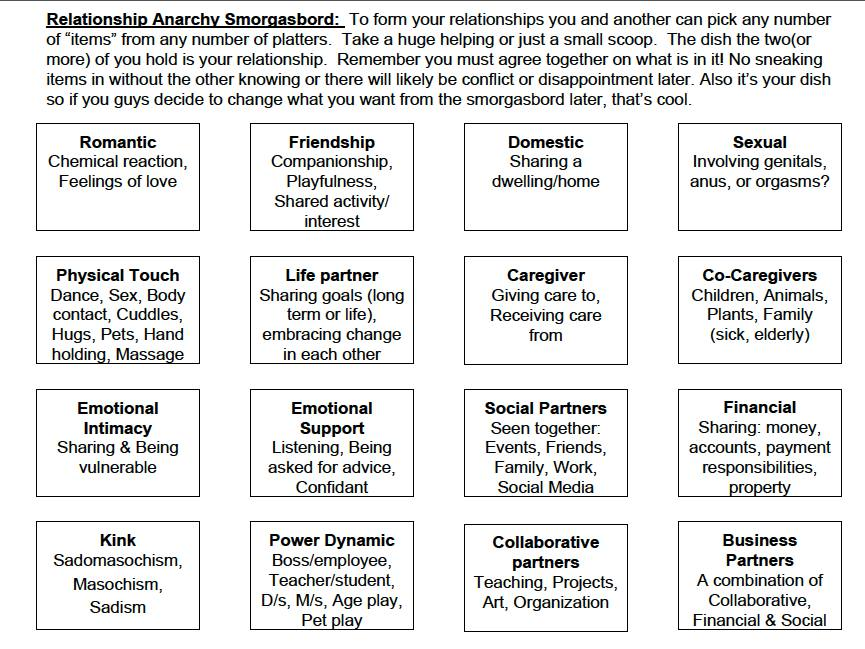What is Relationship Anarchy? Exploring Non-Traditional Relationships
Relationship anarchy prioritises personal autonomy and fluid boundaries, enabling partners to define their relationships freely while emphasising communication, consent and comfort of all involved.
About this article:
Overview:
Relationship anarchy rejects societal norms and predefined roles, allowing individuals to form unique, consensual connections based on autonomy, communication, and mutual respect rather than rigid labels or hierarchies.
Tags:
Uncategorized
Topics:
Relationship Anarchy, Autonomy, Non Monogamy, Communication, Consent, Boundaries
Date:
Author(s):
Cain Parish
What is Relationship Anarchy?
Relationship anarchy is a philosophy that advocates for the removal of societal norms and expectations from interpersonal connections. At its core, it promotes the idea that relationships should be formed based on genuine connections, consent, and mutual respect, rather than conforming to predefined roles. In the realm of relationship anarchy, there are no predefined rules or categories, allowing individuals to shape their relationships according to their unique needs and desires. This approach values emotional bonds and connection over traditional labels, fostering an environment of freedom and authenticity.
In essence, the practice of relationship anarchy is about picking and choosing boundaries personal to you and your partner. All relationship styles can fall under the concept of anarchy, and the final product can be entirely unique to the people participating in the relationship. Rather than use pre-existing definitions for your relationship and modelling your behaviour and boundaries after someone else’s ideas, you get the freedom to decide what is and isn’t appropriate.
For example, it’s widely considered cheating to engage in any romantic or sexual behaviour with a person other than your partner. For most couples, this boundary is a default set in stone by the label of relationship that the couple has applied to themselves. For non-monogamists, however, sexual or romantic exclusivity might not be something that their relationship needs or wants. Under the principle of relationship anarchy, they are free to explore more unconventional boundaries and decide as a team what is appropriate for their specific relationship.
Relationship anarchy also allows you to adjust your priorities according to what is important to you. You might have a friend or family member that takes up more space in your life than your romantic partner. This would be considered strange in mainstream contexts, but a relationship anarchist can absolutely adjust their hierarchy to prioritise what is important to them and their partner. Choosing what is right for your specific situation is a cornerstone of the practice as a whole.
Relationship anarchy is not, however, an excuse to reframe bad behaviour. The boundaries you decide on must be mutual and consensual, and your partner has to have a say in the construction of the rules you set out for one another. The rules don’t have to apply to each of you equally, but they must be mutually agreed to. Relationship anarchists can still cheat, can still lie and can still betray their partner’s interests and trust if they’re not careful.
Below is a graphic of the smorgasbord that I’ve used to explain the idea behind relationship anarchy before. It visualises just how many potential variables can be tweaked in your relationships to create something unique and perfect to your exact circumstances. Anarchy works in all contexts, not just romantic. Your friendships, casual sexual partners and familial relationships can all benefit from the idea of relationship anarchy.

Key Principles of Relationship Anarchy
Relationship anarchy is guided by several key principles that set it apart from conventional relationship models. Whilst the freedom that choosing your own relationship parameters can bring is often very lovely, it’s important to note that there are several non-negotiable rules that make sure you and your partner(s) are healthy and acting in everyone’s best interests. If you’re wondering how to evaluate a potential partner to decide whether to engage in relationship anarchy, you can learn about that here.
Mutual Consent and Autonomy
In relationship anarchy, consent and autonomy are paramount. Every individual involved in a relationship, whether romantic, platonic, or otherwise, has the agency to define the terms and boundaries of the relationship. This principle ensures that all parties are on the same page and actively engaged in building a connection that suits their desires.
Remember, you’re building something together with your partner. Whatever you decide on is going to be a definitive practice for the two of you for the foreseeable future. That doesn’t mean that the two of you can’t change your mind later, but it does mean that getting enthusiastic consent for each of your boundaries is vital. Anarchy can be used as a tool for building unique, fulfilling and satisfying relationships, but it can also be a smokescreen for manipulators and bad faith actors to take advantage of open-minded people. If your partner is attempting to strong arm you into a part of your relationship without your enthusiastic consent or permission, you might need to re-evaluate that relationship.
Non-Hierarchical Approach
Unlike hierarchical relationship models, where certain relationships are deemed more important than others, relationship anarchy rejects this notion. All relationships hold equal value, and there are no predefined rankings. This non-hierarchical approach fosters an environment where connections are nurtured based on their own merits rather than external expectations.
You can begin to appraise your relationships based on their value to you and your partner, and the significance of the relationship between you. Outside influence should have no place in determining how much priority should be given to one person or individual relationship in your life. If a platonic friend is the most significant person in your life, it’s okay to adjust your priorities to suit that decision. We’re used to placing our romantic partners on the top, and everyone else below that. That doesn’t necessarily have to be the case.
Individual Growth and Support
Relationship anarchy encourages personal growth within the context of relationships. Partners support each other’s individual journeys and endeavours, recognizing that personal development contributes to the strength of the connection. This principle allows for an organic and evolving dynamic between individuals.
You’ll find that different boundaries will be developed over time to suit individual needs and particular pathways. Especially in cases where one partner is being held to a different standard than the other, it’s important to make these decisions to support what each member of the relationship is looking for, both inside the relationship and from life itself.
Open Communication
Clear and open communication is the cornerstone of relationship anarchy. Individuals are encouraged to express their needs, desires, and boundaries openly and honestly. This practice ensures that all parties are aware of each other’s expectations, fostering a foundation of trust and understanding. You can learn more about the foundational principles of communication here.
If you’re not practiced at open and strong communication, you will more than likely struggle with relationship anarchy. For some people, without much experience, it can be overwhelming and overly complex. It’s important to know what you like and what you need from your partners, and even more important to know how to communicate those things to your partner.
On the other hand, if you and your partner trust each other and are ready for a challenge, relationship anarchy is an excellent way to develop the skills of emotive communication. Traditional relationship models offer very little in the way of surprises or miscommunication. The movies we watch and the media we consume are very good at showing the boundaries of what is considered a ‘normal’ relationship. When you begin to set your own boundaries, you and your partner will quickly develop the ability to share in a clear and definitive manner, and to resolve disagreements and conflict when they occur.
Benefits of Embracing Relationship Anarchy
Authentic Connections
Relationship anarchy paves the way for authentic connections that are free from societal pressures. Individuals can explore relationships without conforming to predefined norms, allowing them to establish connections that align with their true selves. Rather than fitting to someone else’s idea of a boundary, you are free to express what you need and want from a partner, and let the personal connections take care of the rest.
Freedom from Labels
By rejecting labels and categories, relationship anarchy liberates individuals from the confines of traditional relationship roles. This freedom enables people to engage with others without the fear of fitting into prescribed molds. In much the same way as your identity can be fluid and non-conforming to rigid labels, you can experience a similar freedom when it comes to your dealings with other people.
Personal Empowerment
Relationship anarchy empowers individuals to take charge of their own happiness and well-being. They have the autonomy to define their relationships, set boundaries, and make choices that align with their needs. You are put at the forefront of making yourself happy, which is exactly where you’re supposed to be.
Conclusion: Embracing Relationship Anarchy for Authentic Connections
In a world where relationships are often constrained by societal norms, relationship anarchy provides a refreshing perspective that prioritizes authenticity, autonomy, and open communication. By challenging traditional labels and hierarchies, individuals can form connections that are true to their desires and needs. Whether in romantic or non-romantic relationships, the principles of relationship anarchy invite us to explore connections with an open heart and a liberated mindset.
Above all, it’s worth considering if relationship anarchy is sensible for you. The strengths massively outweigh the negatives if well executed, and the ability to mould your relationships to match your priorities can be incredibly fulfilling and freeing. When in doubt, ask your partner and check the smorgasbord.
F.A.Q.s
Is relationship anarchy the same as polyamory?
No, relationship anarchy and polyamory are distinct concepts. While both challenge traditional monogamous norms, polyamory involves engaging in multiple romantic or sexual relationships simultaneously, with the knowledge and consent of all parties. Relationship anarchy focuses on rejecting labels and hierarchies in relationships.
Can relationship anarchy work for everyone?
Yes, relationship anarchy can work for anyone who values open communication, mutual consent, and individual autonomy. However, it requires a deep understanding of one’s own desires and the ability to communicate effectively with partners. You might find it difficult or potentially overkill to introduce anarchy into a short-term or otherwise uncomplicated relationship dynamic, like a work colleague or other acquaintance.
Are there any downsides to relationship anarchy?
While relationship anarchy offers many benefits, it can also pose challenges. Navigating multiple connections without predefined rules can be complex, requiring strong communication skills and emotional intelligence. It can also be tough to explain to people outside the relationship. You might find yourself critiqued or judged, or see some raised eyebrows from your unconventional relationship tactics.
Stay informed
Receive updates on new research, book releases and insights into strategic communication and personal culture.
No spam. Unsubscribe anytime. Your information is never shared.
